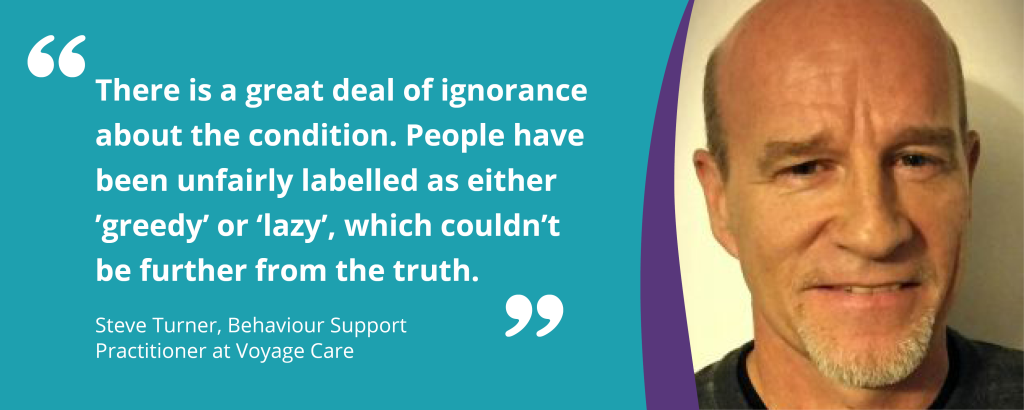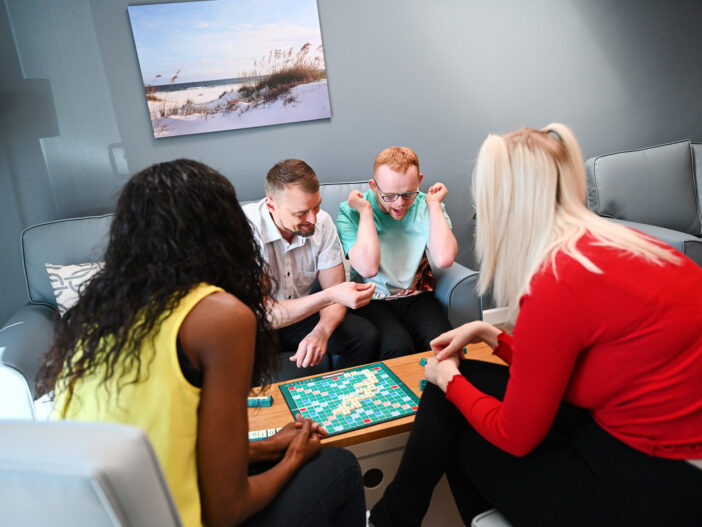The qualities and strengths of Prader-Willi syndrome
Prader-Willi syndrome is a rare, genetic disorder that affects one in 22,000 people worldwide. It’s triggered by the abnormality of the 15th chromosome and affects the part of the brain that controls hormones, including those that regulate appetite and emotions. This results in a variety of symptoms and challenges for those diagnosed with the condition.
In this blog, our Behaviour Support Practitioner, Steve Turner, draws on his experience of working with people with Prader-Willi, to discuss understanding the complexities of this condition while identifying the strengths of this incredibly unique community…
15 years’ experience
I first became aware of Prader-Willi syndrome over 15 years ago when I was working as an Occupational Therapist for the NHS. At the time, there were specialist Prader-Willi services in the area, so I often encountered the staff and the people they supported. My current role at Voyage Care is a Behaviour Support Practitioner. In this role, I continue to work with Prader-Willi services and have had the pleasure of getting to know the people we support a little better.

Banishing misconceptions
In my experience, there has always been a lot of negative preconceptions associated with those that have Prader-Willi syndrome. Many attributes of the condition, such as weight gain and increased appetite, are often misunderstood. As a result, people with the condition are unfairly labelled as either “greedy” or “lazy”, which is not only damaging but also couldn’t be further from the truth.
In fact, there are many positive characteristics and qualities I have identified in people with Prader-Willi syndrome throughout the years that are often overlooked.
Naturally kind and sociable
Most of the people I have encountered with Prader-Willi are naturally very thoughtful, caring, and have a good sense of humour. These qualities mean they are capable of building strong relationships and carry a lot of empathy for others.
People with Prader-Willi are also usually very sociable and friendly, and usually enjoy attending events and gatherings. Because of this, they find it easy to make new friends. This could also be why many of the individuals I’ve supported enjoy the company of animals!
Determined and creative
From an intellectual standpoint, many of the people I have come across with Prader-Willi are very focused and determined. They tend to thrive at activities that require a lot of patience and perseverance, such as jigsaws and puzzles.
This underlying perseverance means they are also motivated to discover and develop new interests. People with Prader-Willi are often very expressive and emotive individuals and therefore naturally lean towards taking up creative hobbies, such as music and art. Many of our specialist Prader-Willi services run art, music, and drama workshops to lean into these strengths and fuel the creative aspirations of the people we support.
Staying active and healthy
Due to the physical implications of Prader-Willi, such as poor muscle tone, obesity, and reduced energy levels, low impact exercise is often encouraged to stay healthy. Many people with the condition also prefer individual activities over the competitive nature of team sports. Because of these two factors, a lot of people with Prader-Willi tend to enjoy walking and particularly excel at swimming!
Supporting people with Prader-Willi syndrome
The most important factor to consider during interactions with individuals that have Prader-Willi syndrome is to avoid applying stereotypes because of their physical attributes.
Every person with the condition is unique and their support should be tailored to meet their individual needs. While Prader-Willi syndrome comes with many challenges, it doesn’t mean people with the condition cannot live happy, fulfilling lives. Identifying individual strengths, interests and helping them to understand their condition, will help inform the right support techniques and the environments they need to thrive!

About Steve Turner
Steve is a member of the Prader-Willi professionals group, a specialist expert forum that connects managers, employees, family members and professionals. His role as a Behaviour Support Practitioner at Voyage Care sees him complete complex assessments to understand behaviour, capture and analyse behavioural data and provide specialist training to our support teams.
Find out more
To learn more about how we can support you, a loved one, or a client with Prader-Willi syndrome to live their best lives, please visit our dedicated webpage.

 Views
Views 

